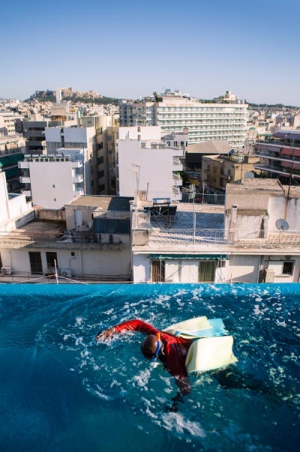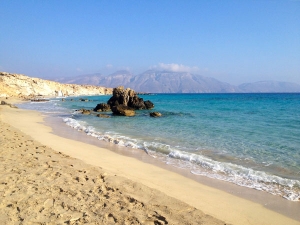XpatAthens
Tips For Running A Successful Business
No matter what type of business you're running or planning to start, here are some helpful tips for your journey to success!
1. Get Organized

One of the best ways to succeed in business is to stay organized. Being organized helps you complete tasks efficiently and stay on top of your responsibilities. A practical approach is to create a daily checklist. As you complete each task, cross it off your list. This not only ensures you don't overlook any crucial tasks but also gives you a sense of accomplishment as you see your list of completed tasks grow.
2. Know Your Competitors

Gaining insights from your competition is invaluable. Don't hesitate to study and learn from them. They might be implementing strategies that could inspire you to differentiate your business. By understanding what works for them, you can adapt and improve your approach, staying competitive in your industry.
3. Understand Risk

Taking sensible risks is a golden key to business growth. Always ask yourself, "What's the possible downside?" Understanding the worst-case scenario allows you to take calculated risks that can lead to significant rewards. This approach helps you make informed decisions that can propel your business forward.
4. Maintain Consistency

Consistency is crucial for maintaining long-term success in business. Always strive to provide top-notch service and high-quality products. Staying true to your core values and differentiators will help you build a reputation for reliability. This consistent performance fosters trust and loyalty among your customers, leading to sustained positive results.
5. Think Outside The Box

Always be on the lookout for ways to innovate and improve your business. Embrace the motto: "Think like there is no box." Keeping an open mind to fresh ideas and new methods can set your business apart from the competition. Continual innovation is essential for staying relevant and ahead in the market.
6. Focus on Customer Experience

A satisfied customer is the best business strategy of all. Prioritize exceptional customer service and create memorable experiences for your clients. Listen to their feedback, address their concerns promptly, and go the extra mile to exceed their expectations. Happy customers are more likely to return and recommend your business to others, driving growth through positive word-of-mouth.
7. Invest in Continuous Learning

The business world is constantly evolving, and staying updated with the latest trends and technologies is essential. Invest in continuous learning for yourself and your team. Attend workshops, enroll in courses, and participate in industry conferences. This commitment to ongoing education will help you stay competitive and innovative, ensuring your business remains at the forefront of your industry.
Whether you’re starting a new business, strategizing a website build, expanding your products and services, or figuring out what’s next for your business, we love helping businesses and their leaders gain clarity and thrive!
Embassy Of South Africa In Greece
Telephone: 003 021 06178020
Location: 60 Kifissias Avenue, Marousi, 15125
More information can be found in French and Greek on the embassy's official website.
Follow the South African embassy on Facebook.
February Fun & Opera Adventures At The Maria Callas Museum
- Every Thursday in February and March at 11:00 a.m.
- A unique opportunity for visitors aged 65 and above to explore the museum's treasures with complimentary guided tours included in the ticket price.
- Plan your visit: Duration: 50 minutes; Entrance: 7 euros for 65+; Tour: free. Limited seats; early arrival is recommended.
- Sunday, February 18 at 18:00.
- In collaboration with the Italian Educational Institute, enjoy the film directed by Franco Zeffirelli, with Italian dialogue and Greek subtitles.
- General Admission: €10/person. Duration: 1h 45m. Combine your museum visit with the film for a comprehensive experience.
- "Sets and Stories" on February 17, ages 8 to 12, from 10:30 to 11:30 am.
- Children and chaperones get creative with a workshop inspired by museum exhibits and opera stories, becoming set designers and bringing their imaginative worlds to life.
- Theatrical workshop. Limited to 20 children. Participation: 8 euros per child with a museum ticket or companion. A phone reservation is required.
- Saturday, February 17, for ages 3-5, from 3:00 to 4:00 pm.
- A storytelling session with theatrical, musical-motor games, and visual activities for children accompanied by their guardians.
- Participation: 7 euros per child with museum entrance or companion. A phone reservation is needed up to 10 days before the workshop.
- To plan your visit and reserve your spot, call 210-44-04 204.
- For online bookings, please click here!
Note: Limited tickets are available; book in advance to secure your spot. For in-person ticket purchases, visit the Maria Callas Museum box office. Telephone reservations are accepted from Tuesday to Friday, 11:00–16:00.
Simplifying Access To Electronic Health Records
“Our aim is for all hospitals in the country to communicate with one another, as well as with the national medical record, the electronic prescription system, and any other structures of the Health Ministry,” Digital Governance Minister Dimitris Papastergiou told the Athens-Macedonian News Agency.
“This initiative has significant implications beyond merely improving organizational efficiency. Consider how much easier it will be for citizens if all health-related information is immediately available on their mobile devices, eliminating the need to carry physical folders of medical tests. Additionally, think of the reduction in bureaucracy if the attending physician has direct access to this information.”
All data related to a patient’s medical history – including diagnostic tests, laboratory results, and radiological images – will be available in the myHealth App.
Originally published on: ekathimerini.com
Beekeeping In Athens
Would you like to come and see my bees? A friend asked me. No, it wasn’t a pick-up line, my friend genuinely has bees on a small mountainside in Melissia, a suburb to the north of Athens. So one rather temperamental Sunday (weather wise), off we go. Bees’ll be a bit moody. Paul looks up at the constantly shifting and menacing clouds. Hmm, do I need to worry about this?
He must’ve seen my concern because he pats me on the back and says, Don’t worry, you’ll be suited up.
Paul and his friend have eight hives – four of them new – and have been keeping bees for about 3 years.
Have you ever had any honey?
According to Paul, “The last year or two hasn’t seen a lot of honey produced, not just with us, but a lot of beekeepers in Greece say the same. Bees are sensitive to environment, and some put it down to all the negativity around re: the financial crisis. They just stop producing.”
It’s an interesting theory. Paul and his friend also told me that bees definitely have their own personality. And I can believe it. Let’s face it, bees are what keeps us all going, with their pollination. It was Einstein who famously said: If the bee disappeared off the surface of the globe, then man would only have four years of life left. No more bees, no more pollination, no more plants, no more animals, no more man.
So, back to their personalities: there’s the Queen – who only mates once. She leaves the hive to mate with the Drone bees outside and comes back to lay eggs in a cell in the hive. A Queen has a lifespan of 3 years, the rest 3 months (see? Females are stronger).
Then there’s the Guard Bee – guards the hive – Maintenance Bees, who do exactly that. In fact, if you want a perfect example of Collectivism, you should study bees more carefully! We could learn a lot from them I think.
Get suited and booted before going near them, especially hive 12!
I am warned.
That’s a difficult one. So I suggest you stay back.
They’re pointing at the infamous Hive 12. By now, we’ve sat outside on the patio and had some juice and snacks, I’m suited up and we’re in the hive. First, the hive is ‘smoked’ (think of something similar to what they use in churches when they wave around their incense).
This calms them down.
To read more, please visit leavingcairo.com
By Bex
Seven Things To Do In Ancient Corinth
Forty- eight miles west of the great city of Athens, Ancient Corinth, one of Greece’s richest cities, stood as a radiant beacon on the narrow isthmus connecting the Peloponnesian peninsula to the mainland of Greece. A cultural and commercial center, as well as a naval power, Corinth enjoyed a commanding presence in the ancient world, owed largely to its strategic positioning.
It had two ports, one on the eastern side of the isthmus (Lecheon) for trade with European and Northern African merchants from throughout the Mediterranean. The other stood on the western edge (Kenchreai) for trade with Aegean, Persian, and Egyptian traders.
Every second spring witnessed the Isthmian Games in honor of the Earthshaker, Lord Poseidon, Greek god of the sea. In the mythical tales of Caenus, crown prince of ancient Iolkos, as recounted in the novel Caenus and The Quiver of Artemis, Caenus sets out to prove his worth at the fictional Apollo’s Tournament in Corinth, a city that was as famous as it was infamous. While at the tournament, Caenus meets a local peasant girl named Adriande, who takes Caenus on a tour of some of the very sights I mention below.
Following are Seven Things To Do In Ancient Corinth:
1. Visit The Doric Temple Of Apollo: Apollo, one of the twelve Olympians, was the Greek god of light, truth, prophecy and archery. He shared his penchant for archery with his twin sister Artemis, whose poison-tipped arrows could kill immediately. Built on a hill overlooking the agora marketplace, the Temple of Apollo displayed exquisite craftsmanship. It included 38 Doric columns and inspired all who saw it. Strike up the lyre.
2. Stroll Through The Agora: The agora was an ancient marketplace. Surrounded by colonnades and stoas (covered walkways), the agora served as the hub of the city's political and economic life. There were shops, museums, temples, and administrative buildings. Near the agora was the Elephant’s Tusk, a local taverna where Caenus meets a local peasant girl named Adriande, whom he later falls for.
3. Climb To The Top Of The Acrocorinth: The Acrocorinth was a monolithic rock, a veritable castle fortress overlooking the city. With its secure water supply, Acrocorinth was used as the last line of defense in southern Greece, repelling foes from entry into the Peloponnesian peninsula. Legend held that, Pegasus came here to drink from a spring. The climb is definitely worth the effort. The view of both of the city’s ports is simply breathtaking.
4. Walk The Diolkos: The diolkos (Greek for "haul across"), was a stone-paved roadway that connected the Saronic Gulf with the Gulf of Corinth, effectively linking Corinth’s two ports. This overland route was highly valuable in that it allowed merchants, passengers and cargo to avoid the difficult and time-consuming trip around the southern end of the Peloponnesian peninsula. Walk a mile in the sandal prints of these ancient traders.
5. Join The Cult of Aphrodite, Attend Her Festival, Aphrodisia: Ahh, Aphrodite… The Greek goddess of love and beauty was worshipped widely. Women wanted to be her. Men wanted to be with her. The Temple of Aphrodite, at the summit of the Acrocorinth, was the site for the most active festival honoring the goddess: Aphrodisia. During this festival the Cult of Aphrodite was quite active, engaging in ritualized prostitution… all in the name of the goddess, of course. This festival was not for the faint of heart.
6. Drink From The Sacred Spring At The Fountain of Peirene: Near the north-west end of the agora was the large public Fountain of Peirene, a marvel in marble. Within, there were chambers through which the water flowed into an open pool. Seven steps led downward to the sacred spring where priests were said to consult with Apollo.
7. Attend Apollo’s Tournament: Every year the summer solstice launched the Festival of the Sun in Corinth. The prestigious Apollo’s Tournament, was the main attraction. Based upon the Isthmian Games, Apollo's Tourney was a grueling contest of skill and might, pitting princes and noble sons against one another in such competitions as bull riding, endurance running, wrestling, and sword fighting. In Caenus and the Quiver of Artemis, Caenus and his nemesis Makedon are guided by the hands of the gods toward an epic showdown in the final stage of the tournament.
Source: C.S. Ledbetter
International Food Franchises No Doing Well In Greece
The Greek market is a very difficult place for international food and coffee franchises. Greeks are creatures of habit and it is not that easy to change their routine, the way they eat or enjoy their coffee. It is not a secret that people in Greece consume large amounts of coffee on a daily basis.
But why are companies such as Starbucks or Costa Coffee failing in a country where people would “waste” three hours of their day sitting around in coffee shops? That is exactly the reason. Greeks need a place where they can feel welcome to sit with their friends and talk about their daily lives for hours at a time. However, self-service companies such as Starbucks do not feel so welcoming.
Furthermore, Starbucks and other foreign coffee franchises prohibit smoking, which is another major part of Greek people’s lives. Almost every group of friends in Greece has a smoker in their midst, who usually complains about not being able to smoke, and therefore they choose to visit a coffee shop with a more “smoking-friendly” environment.
In 2014, Starbucks raised its prices in the U.S., however the company was forced to drop its prices in Greece, claiming that the reason behind it was a VAT decrease. The problem with international coffee franchises is that they refuse to adapt to Greek culture, to the way people choose to enjoy their daily beverages, whether that is coffee, tea or something sweeter like a frappuchino.
To read more, please visit greekreporter.com
By Ioanna Zikakou
Antiparos Beach Houses
The houses are built in traditional Cycladic style, in white with stone walls. They are fully equipped and tastefully furnished. A baby bed is available. The houses can be rented separately or together.
Accommodation Beach House: Large living and dining room has a built-in double bed and sofas that can be used as another bed. There is an open kitchen with marble counters. The hall off the living/dining room leads to a recently refurbished shower room and spacious bedroom with three single beds (bunk bed, plus one). Both rooms open onto the terrace with views over the garden and sea. Sleeps 4-6.
Beach Duplex: Duplex with two large rooms, each of which has en suite shower room and kitchenette. The downstairs room has a double bed, while the upstairs has three single beds. Both levels have a terrace, with the one on the lower floor stretching into the garden and shaded by an attractive eucalyptus tree. Sleeps 5.
‘X Apartments’ Offers Glimpse Into Lives Of Others
by
Maria Katsounaki
Best Uninhabited Island Destinations In Greece
To read this article in full, please visit: Greek Reporter











